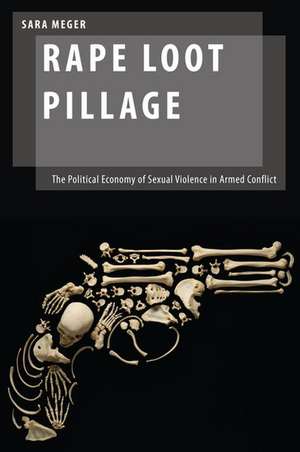Rape Loot Pillage: The Political Economy of Sexual Violence in Armed Conflict: Oxford Studies in Gender and International Relations
Autor Sara Megeren Limba Engleză Hardback – 18 aug 2016
Din seria Oxford Studies in Gender and International Relations
- 27%
 Preț: 370.37 lei
Preț: 370.37 lei - 23%
 Preț: 453.86 lei
Preț: 453.86 lei - 19%
 Preț: 617.59 lei
Preț: 617.59 lei - 14%
 Preț: 199.10 lei
Preț: 199.10 lei - 24%
 Preț: 370.87 lei
Preț: 370.87 lei - 27%
 Preț: 426.14 lei
Preț: 426.14 lei - 7%
 Preț: 216.34 lei
Preț: 216.34 lei - 16%
 Preț: 491.33 lei
Preț: 491.33 lei -
 Preț: 235.79 lei
Preț: 235.79 lei - 19%
 Preț: 127.24 lei
Preț: 127.24 lei - 19%
 Preț: 177.77 lei
Preț: 177.77 lei -
 Preț: 258.50 lei
Preț: 258.50 lei - 10%
 Preț: 439.09 lei
Preț: 439.09 lei - 9%
 Preț: 480.59 lei
Preț: 480.59 lei - 18%
 Preț: 345.75 lei
Preț: 345.75 lei - 13%
 Preț: 135.12 lei
Preț: 135.12 lei - 27%
 Preț: 402.03 lei
Preț: 402.03 lei - 15%
 Preț: 277.35 lei
Preț: 277.35 lei - 19%
 Preț: 198.22 lei
Preț: 198.22 lei -
 Preț: 287.11 lei
Preț: 287.11 lei - 14%
 Preț: 278.91 lei
Preț: 278.91 lei -
 Preț: 265.32 lei
Preț: 265.32 lei - 12%
 Preț: 215.78 lei
Preț: 215.78 lei - 14%
 Preț: 177.77 lei
Preț: 177.77 lei - 20%
 Preț: 279.41 lei
Preț: 279.41 lei - 30%
 Preț: 612.43 lei
Preț: 612.43 lei - 23%
 Preț: 183.17 lei
Preț: 183.17 lei - 30%
 Preț: 492.40 lei
Preț: 492.40 lei - 11%
 Preț: 222.30 lei
Preț: 222.30 lei - 18%
 Preț: 225.04 lei
Preț: 225.04 lei - 30%
 Preț: 552.22 lei
Preț: 552.22 lei - 30%
 Preț: 494.84 lei
Preț: 494.84 lei - 30%
 Preț: 491.59 lei
Preț: 491.59 lei - 30%
 Preț: 581.39 lei
Preț: 581.39 lei - 30%
 Preț: 521.67 lei
Preț: 521.67 lei - 23%
 Preț: 163.62 lei
Preț: 163.62 lei - 30%
 Preț: 548.28 lei
Preț: 548.28 lei - 11%
 Preț: 400.01 lei
Preț: 400.01 lei
Preț: 582.53 lei
Preț vechi: 791.69 lei
-26% Nou
Puncte Express: 874
Preț estimativ în valută:
111.46€ • 116.69$ • 92.23£
111.46€ • 116.69$ • 92.23£
Carte tipărită la comandă
Livrare economică 25-31 martie
Preluare comenzi: 021 569.72.76
Specificații
ISBN-13: 9780190277666
ISBN-10: 0190277661
Pagini: 250
Dimensiuni: 236 x 163 x 28 mm
Greutate: 0.61 kg
Editura: Oxford University Press
Colecția OUP USA
Seria Oxford Studies in Gender and International Relations
Locul publicării:New York, United States
ISBN-10: 0190277661
Pagini: 250
Dimensiuni: 236 x 163 x 28 mm
Greutate: 0.61 kg
Editura: Oxford University Press
Colecția OUP USA
Seria Oxford Studies in Gender and International Relations
Locul publicării:New York, United States
Recenzii
Thought-provoking contribution to scholarship
...what makes this book a distinguished piece of scholarship is its attempt to provide a clear-cut and comprehensive vision for understanding wartime rape and other forms of sexual violence by unveiling and analysing the related social, political and economic systems that promote the commission of these crimes and how to respond to them.
Like all good books, Rape, Loot, Pillage, is as rich for the analysis produced, as for the questions and thinking it sparks.
Meger's book is skilfully written and very well argued. Although other feminist scholars have also discussed securitization, Meger's analysis goes deeper, by drawing on the Marxist concept of 'commodity fetishism' to explain the 'fetishization' of sexual violence in international relations'... very rich on a theoretical level.
We think: war is about mens violence to other men; sexual violence is about mens violence against women. How startling, then, to read Sara Megers powerful analysis of the intricate intimacies between them. Impassioned, incendiary, and illuminating, Meger brings together micro and macro, and renders each, and both, comprehensible in a new way.
...what makes this book a distinguished piece of scholarship is its attempt to provide a clear-cut and comprehensive vision for understanding wartime rape and other forms of sexual violence by unveiling and analysing the related social, political and economic systems that promote the commission of these crimes and how to respond to them.
Like all good books, Rape, Loot, Pillage, is as rich for the analysis produced, as for the questions and thinking it sparks.
Meger's book is skilfully written and very well argued. Although other feminist scholars have also discussed securitization, Meger's analysis goes deeper, by drawing on the Marxist concept of 'commodity fetishism' to explain the 'fetishization' of sexual violence in international relations'... very rich on a theoretical level.
We think: war is about mens violence to other men; sexual violence is about mens violence against women. How startling, then, to read Sara Megers powerful analysis of the intricate intimacies between them. Impassioned, incendiary, and illuminating, Meger brings together micro and macro, and renders each, and both, comprehensible in a new way.
Notă biografică
Sara Meger is Assistant Professor in the Department of Gender Studies at Central European University.









